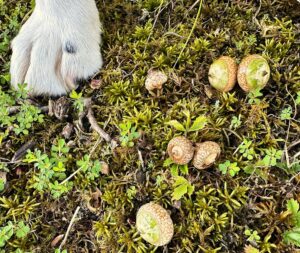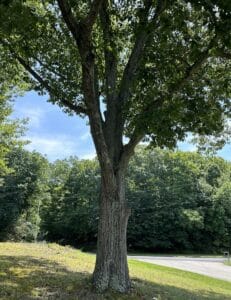Hello, fellow lovers of all things green,
An entertaining exchange about the probable causes of an abundance of acorns dropping early leads to lessons in letting go, thanks to Chris from Blairstown, NJ, who asked if I ever saw acorns fall this early. “Our trees in the back started dropping them about three or four weeks ago, and not a few, a lot.”

Early Acorn Drop at the Blairstown Airport.
I hadn’t noticed an abundance of acorns falling early, but a few always do. Oak trees have two rounds of dropping acorns, the first in the summer, dropping less viable or diseased acorns —a way of shedding those weighing them down. And in the fall, the mature acorns drop.
“It’s crazy. I’ve never seen acorns drop so early. It’s a good story for your blog. I’m pretty sure the world is coming to an end.”
Chris sent photos of the dilemma; indeed, an overabundance of early dropped acorns are on his lawn. Perhaps the trees are shedding a surplus developed during the wet spring.
“Maybe leave out the part about the world coming to an end. You may lose some of your subscribers (smiley face).”
Perhaps Spongy Moths are the culprit?

A favorite host is Oak, though Spongy Moths love to feed on many species of trees.
Later that day, it occurred to me that Spongy Moths, formerly called Gypsy Moths, have been an issue in nearby areas. But they hadn’t invaded Chris’s property. Native to Eurasia, unlike many unfavorable insects that arrive here accidentally, Spongy Moths (Lymantria dispar disparla) were brought here intentionally in the 1860s as a possible source of silk fiber when the traditional silk moth became diseased at the same time that the Civil War affected the production of cotton crops.
A side note on the name change: the Entomological Society of America dropped the common names of the Gypsy Moth and the Gypsy Ant because “the names are inappropriate and offensive. The Romani people, or Roma, are Europe’s largest ethnic minority and face discrimination. Gypsy is considered a pejorative term.”
I always thought that the definition of a gypsy is somebody who moves from place to place in an adventurous kind of way. My mother called me a gypsy when I moved often as a young person, bringing my belongings and sending others forward through UPS. Names can mean something favorable to one group and offensive to another.
Gypsy Moths are now called Spongy Moths due to their spongy egg masses. A favorite host is Oak, though they love to feed on many species of trees. In June, my clients’ oak trees in Glen Spey, NY, were leafless. I’ll have to give them a ring and see if they have immature acorns all over the ground, too. It would make sense so the trees could put their energy into growing new leaves. Trees are indeed resilient, and they know what to let go of.
Trees shed leaves and nuts during extreme weather.
Acorns can drop early due to extreme weather conditions like our long run of excessive heat and dryness. The same is true for leaves.

Paulinskill Rail Trail is dotted with golden leaves that have served their time.
Yesterday, while walking on the Paulinskill Rail Trail, I noticed golden leaves dropping from trees, shedding those that served their time. We can parallel the same concept in our lives, letting go of things that take too much energy from our bodies or souls. I struggle with that and tend to hold on to things longer than I likely should, although being committed to routines, your work, and relationships is a good thing. But when they drain you, it’s time to reevaluate.
Lessons of Letting Go
What about you? Do you have difficulty shedding the old to make room for the new, or in the case of the oak trees, shedding the new that is a strain to sustaining your health? It’s something to think about.
“Letting go takes a lot of courage sometimes. But once you let go, happiness comes very quickly”— powerful words by Thich Nhat Hanh, a well-known Vietnamese monk whose wisdom helped improve the world and still does with his writings left behind.
We can learn much from nature. We can let go of things that harm us while being kind and understanding that there are waves of hardships in people’s lives. As we endure them, we can hold on to the expectation that after every storm, the sun will shine, and in that comes great hope.
Garden Dilemmas? AskMaryStone@gmail.com and your favorite Podcast App.
There’s more to the story in the Garden Dilemma’s Podcast (a soothing 10-minutes):

Gallium odoratum – Sweet Woodruff
… including a story behind this lovely ground cover.
Related Stories & Helpful Links:
Native Plants, especially Oaks, are Essential – Blog Post
Ep 35. Leaf Therapy, Essential Oaks
NPR’s article Insect Experts Will Change The Name Of The ‘Gypsy Moth’ and ‘Gypsy Ant’ (July 2021)



I am feeling uplifted by your writing!
I was looking for an answer as to why sooo many acorns are dropping now-
Perhaps it was the infestation of spongy moths!
We were inundated with caterpillar poop on our new deck and now the ballistic acorns!
Nature is giving us a run for our money!
Hi Barbara, Mother Nature indeed throws us curve balls! And sometimes they make a mess of things. But this too shall pass (smile). Thank your kind note and for reading the story, Mary Stone
Did you live in Haupauge N.Y.? I was friends with a Mary Stone in high school. Just curious.
Hi Lynda, No, I don’t live there. I am learning Mary Stone is a common name. It’s a good thing each of us, no matter our name, is unique – just like plants. :^) Thanks for reading my post, Mary